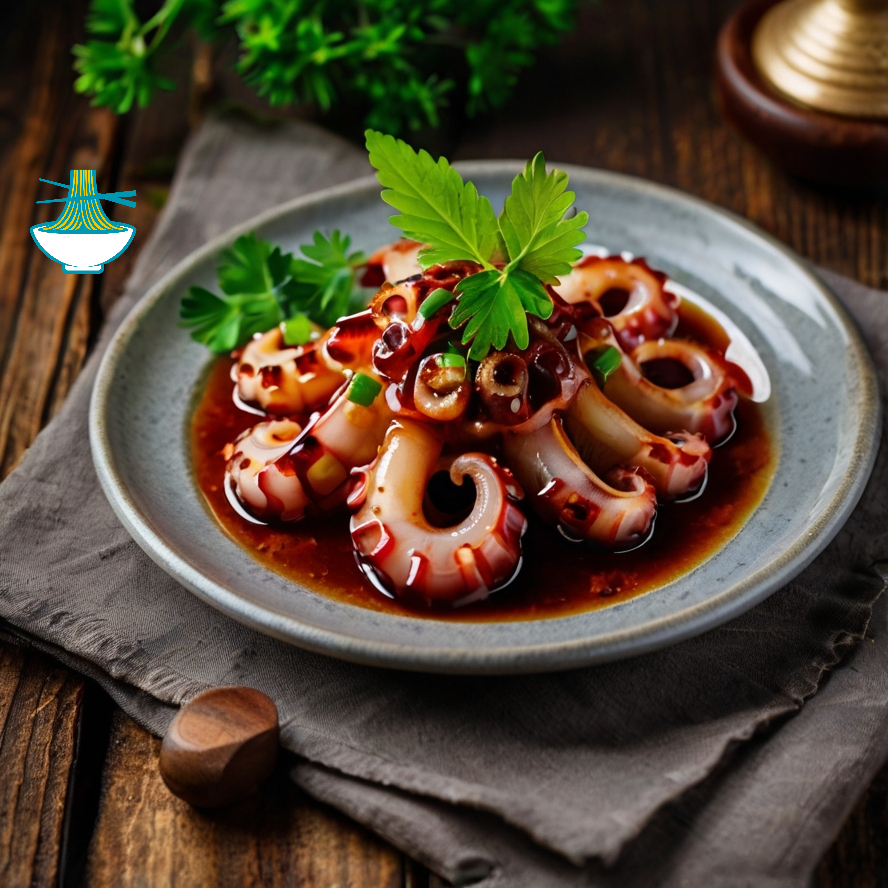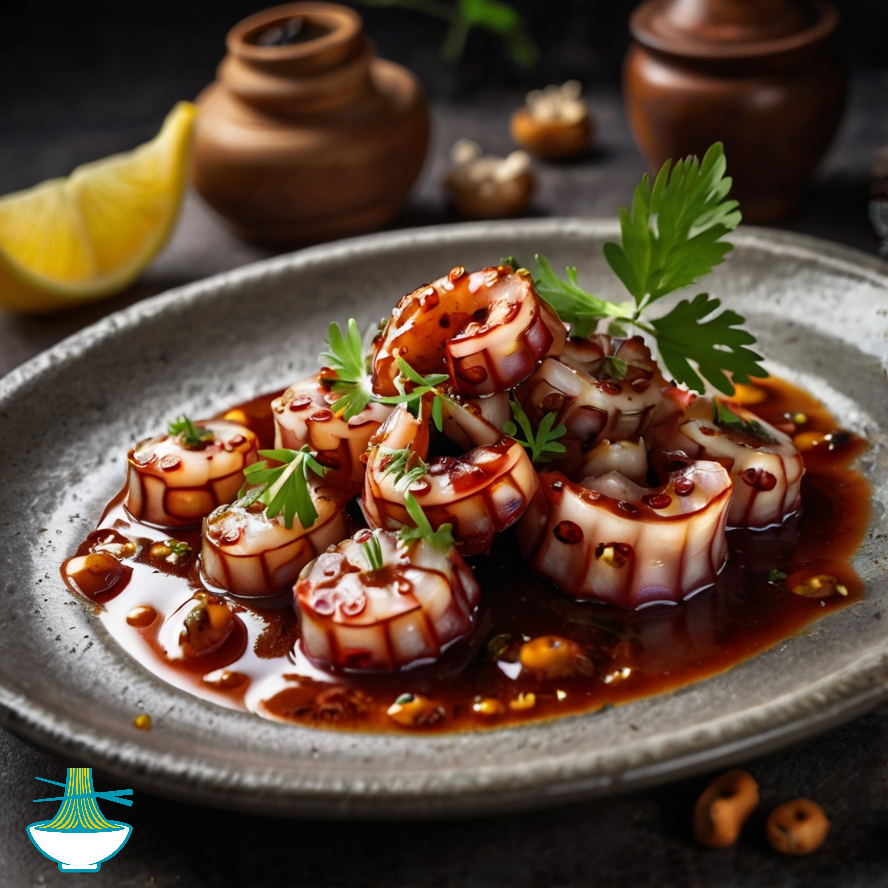Marinated Octopus is a flavorful dish that combines the tender texture of octopus with the zesty kick of a tangy marinade. Octopus is a low-calorie meal, high-protein seafood rich in essential nutrients like vitamin B12, selenium, and iron, which support energy production, immune health, and oxygen transport in the body. Additionally, it provides omega-3 fatty acids that promote heart health and reduce inflammation. This dish is not only delicious but also packed with nutritional benefits, making it a must-try for seafood lovers.
Ingredients:
- 1.5 lbs fresh octopus
- 1/4 cup olive oil
- 2 tablespoons red wine vinegar
- 1 lemon (juice and zest)
- 2 garlic cloves, minced
- 1 teaspoon dried oregano
- 1/2 teaspoon smoked paprika
- 1/2 teaspoon black pepper
- Salt to taste
- Fresh parsley for garnish
Instructions:
- Clean the Octopus: Start by thoroughly cleaning the octopus. Use a sharp knife to remove the beak located in the center of the tentacles. Gently pull out the internal organs and discard them. Rinse the octopus under cold running water to remove any remaining impurities. This step is essential to ensure the octopus is clean and free of any unpleasant taste.
- Boil the Octopus: Fill a large pot with water and bring it to a rolling boil. Once the water is boiling, carefully add the octopus. Allow it to cook for 40-50 minutes. The exact time may vary depending on the size of the octopus, but the key is to cook it until tender. Avoid overcooking, as this can result in a rubbery texture. You can test the tenderness by poking the thickest part of the tentacle with a fork—it should be soft and easy to pierce.
- Drain and Cool the Octopus: After the octopus has cooked, remove it from the pot and set it aside to cool. Place it in a colander to drain any excess water. Allow it to rest and cool down completely before handling it further. This will make it easier to cut and handle.
- Slice the Octopus: Once the octopus has cooled, place it on a clean cutting board. Slice the octopus into bite-sized pieces. Aim for uniform cuts to ensure the pieces are evenly marinated. The texture of the octopus should be tender and slightly chewy, which makes for a delightful eating experience.
- Prepare the Marinade: In a large mixing bowl, combine 1/4 cup olive oil, 2 tablespoons red wine vinegar, the juice and zest of 1 lemon, 2 minced garlic cloves, 1 teaspoon dried oregano, 1/2 teaspoon smoked paprika, 1/2 teaspoon black pepper, and a pinch of salt. Whisk the ingredients together until they are well combined. The olive oil and vinegar provide a rich, tangy base, while the garlic, oregano, and smoked paprika add layers of flavor to the marinade.
- Marinate the Octopus: Add the sliced octopus pieces to the prepared marinade. Toss the pieces gently to ensure they are evenly coated with the marinade mixture. Make sure each piece of octopus is well-coated to absorb the flavors. Cover the bowl with plastic wrap or a lid, and refrigerate it for at least 2 hours. This allows the flavors to meld together and lets the octopus absorb the marinade, enhancing its taste.
- Serve: Once the marination time has passed, remove the octopus from the refrigerator. Give it a final gentle toss to redistribute the marinade. Serve the marinated octopus chilled or at room temperature. Garnish with freshly chopped parsley for a pop of color and added freshness. You can serve it as an appetizer or as part of a larger meal, paired with sides like a Greek salad, roasted vegetables, or quinoa for a complete dish.
Nutritional Modifications and Dietary Adjustments:
For those following specific dietary plans, Marinated Octopus can be easily adapted to fit various needs:
Vegetarian or Vegan Alternatives:
- While octopus itself isn't vegetarian or vegan, a plant-based alternative could be used. For example, marinated and grilled king oyster mushrooms or tofu could replicate the texture of octopus and absorb the marinade flavors.
Gluten-Free Option:
- The recipe as it stands is already gluten-free. However, if you are serving it with side dishes like bread or sauces, ensure they are gluten-free to maintain the integrity of the diet.
Low-Carb and Keto-friendly:
- This dish is naturally low in carbs, making it suitable for anyone following a low-carb or ketogenic diet. For a complete meal, consider pairing it with low-carb vegetables like zucchini noodles or roasted cauliflower.
Serving Suggestions:
- This Marinated Octopus pairs well with side dishes such as a fresh Greek salad, roasted vegetables (like bell peppers, zucchini, and eggplant), or a lemony quinoa salad for a nutritious and filling meal.
Tips for Perfectly Preparing Octopus:
How to Make Sure the Octopus is Tender:
- To achieve the perfect tender texture, it’s important not to overcook the octopus. The recommended boiling time of 40–50 minutes is ideal. If overcooked, it can become rubbery.
- For extra tenderness, you can also freeze the octopus before cooking it. Freezing helps break down the fibers and tenderize the meat, ensuring a softer texture.
Choosing the Best Octopus:
- When shopping for octopus, look for fresh, firm tentacles with a shiny, smooth surface. Avoid any octopus that looks slimy or has a strong fishy odor.
- If buying frozen octopus, ensure that it was frozen immediately after capture, which helps preserve its texture and flavor.
Presentation Ideas:
- Garnish and Plating: Serve the marinated octopus on a plate with a sprinkle of fresh herbs like parsley or cilantro. A drizzle of olive oil and a wedge of lemon on the side can add both color and zest.
- Creative Plating: Consider serving the octopus in a grilled pita pocket or on a bed of couscous to make it more appealing as a main dish.
Frequently Asked Questions (FAQs):
Can Marinated Octopus be Stored?
- Yes, you can store marinated octopus in an airtight container in the refrigerator for up to 2 days. The marination time will actually enhance the flavors, but the dish should be consumed within this time for optimal freshness.
What are Some Other Ways to Prepare Octopus?
- Octopus can be grilled, braised, or cooked in tomato sauce. Grilling brings out a smoky flavor, while braising in a flavorful broth makes the meat tender and rich. For a Mediterranean twist, you can also cook it in a tomato-based sauce with herbs and serve over pasta or rice.
Can I Substitute Ingredients in This Recipe?
- If you prefer a different oil, you can use avocado oil instead of olive oil for a slightly different flavor. Similarly, if you don’t have red wine vinegar, apple cider vinegar or balsamic vinegar can work as alternatives.
- If you're not fond of smoked paprika, regular paprika or chili flakes can provide a milder heat.
Can I Use Frozen Octopus Instead of Fresh?
- Yes, frozen octopus can be used, and it may even be more tender because freezing helps break down the tough fibers. When using frozen octopus, make sure to thaw it completely before cooking.
How Does Octopus Compare to Other Seafood in Terms of Health Benefits?
- Octopus vs. Shrimp: Octopus is leaner than shrimp and provides a higher amount of omega-3 fatty acids. While shrimp is low in fat and calories, octopus is a richer source of iron and vitamin B12, which makes it a better choice for individuals needing to boost energy and support immune health.
- Octopus vs. Salmon: Octopus and salmon both offer heart-healthy omega-3s, but octopus is lower in fat and calories, making it a good choice for people looking for a leaner protein source. Salmon is higher in vitamin D, but octopus provides more iron.

Nutritional Values and Benefits
1. Octopus (1.5 lbs)
- Calories: 300
- Protein: 60g
- Fat: 2g
- Vitamin B12: 36mcg (600% DV)
- Iron: 9mg (50% DV)
- Omega-3 Fatty Acids: 700mg
Nutritional Benefit: Octopus is a lean source of protein, rich in vitamin B12 for energy, iron for oxygen transport, and omega-3s for heart health.
2. Olive Oil (1/4 cup)
- Calories: 480
- Fat: 54g
Nutritional Benefit: Olive oil is high in monounsaturated fats, which support heart health and reduce inflammation.
3. Red Wine Vinegar (2 tablespoons)
- Calories: 6
Nutritional Benefit: Red wine vinegar is low in calories and contains antioxidants that support digestion and metabolism.
4. Lemon (1 medium)
- Calories: 17
- Vitamin C: 31mg (52% DV)
Nutritional Benefit: Lemon adds vitamin C, an antioxidant that boosts immunity and promotes skin health.
5. Garlic (2 cloves)
- Calories: 9
Nutritional Benefit: Garlic contains allicin, which supports heart health and has antimicrobial properties.
6. Dried Oregano (1 teaspoon)
- Calories: 5
Nutritional Benefit: Oregano is rich in antioxidants and has anti-inflammatory properties.
7. Smoked Paprika (1/2 teaspoon)
- Calories: 3
Nutritional Benefit: Paprika provides antioxidants like carotenoids, which support eye health and reduce oxidative stress.
8. Parsley (for garnish)
- Calories: 2 (per tablespoon)
Nutritional Benefit: Parsley is rich in vitamin K, which supports bone health and blood clotting.
Merged Nutritional Benefits: Marinated Octopus is a nutrient-dense dish offering high-quality protein, omega-3 fatty acids, and essential vitamins and minerals. The octopus supports muscle repair and heart health, while the marinade ingredients like olive oil, garlic, and lemon provide additional antioxidants and anti-inflammatory benefits. This dish is both delicious and nourishing.
Health Benefits of Octopus:
Octopus is a highly nutritious seafood, not only rich in protein but also a great source of essential nutrients. It is particularly beneficial for individuals with chronic conditions such as heart disease or diabetes due to its low-fat content and high omega-3 fatty acids.
- Heart Health: Octopus is packed with omega-3 fatty acids, which help lower cholesterol levels, reduce inflammation, and improve overall heart health.
- Blood Sugar Management: The lean protein in octopus can help stabilize blood sugar levels, making it a good option for diabetics looking for a low-calorie, high-protein food that doesn't spike blood sugar.
- Weight Management: With low fat and high protein content, octopus is a great food choice for those aiming to lose or maintain weight.


Comments